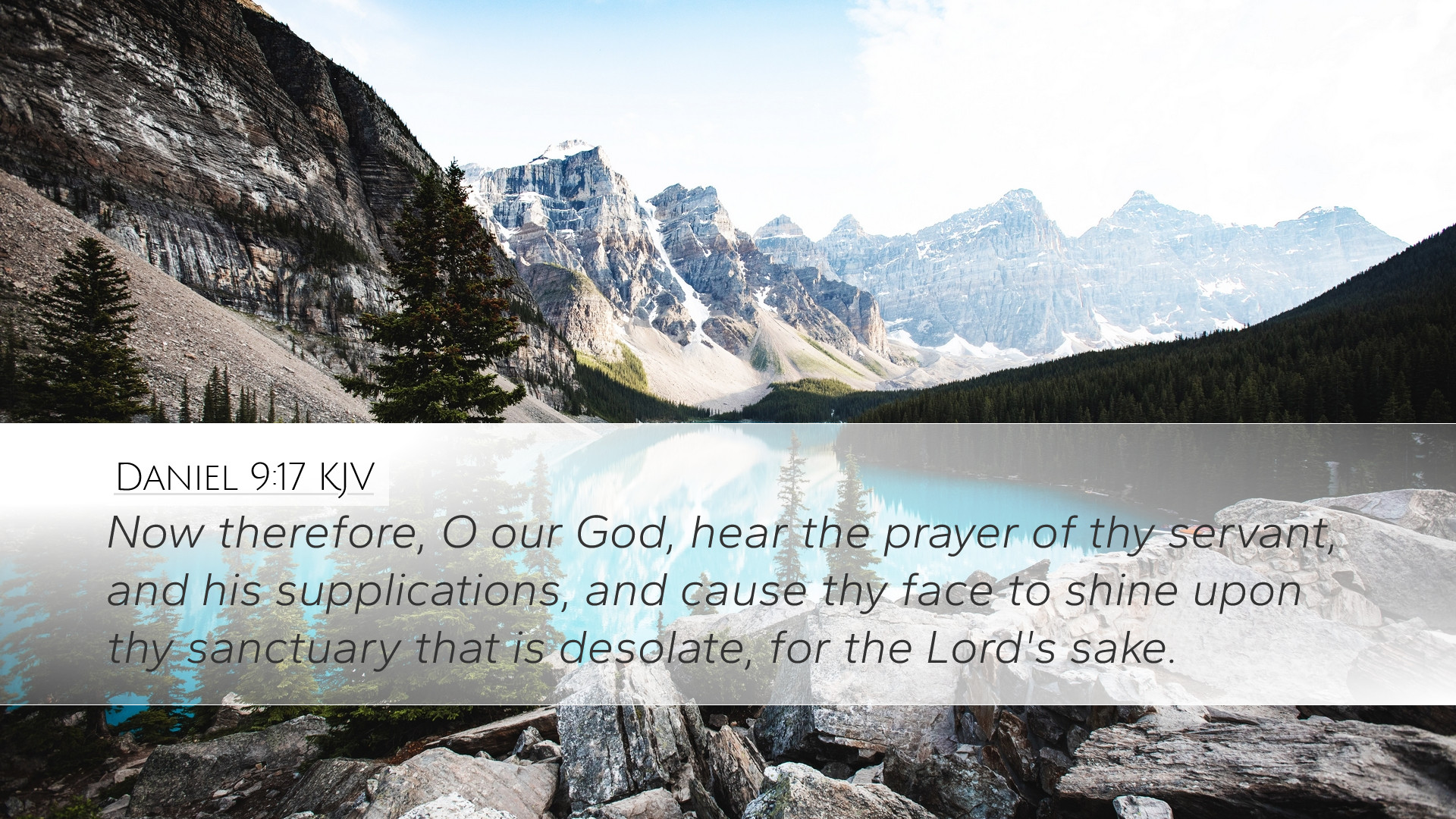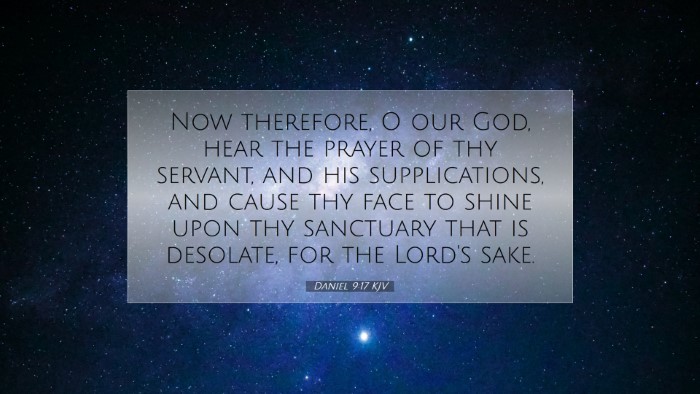Commentary on Daniel 9:17
Daniel 9:17 states: "Now therefore, O our God, hear the prayer of Your servant, and his supplications, and for the Lord’s sake cause Your face to shine on Your sanctuary, which is desolate." This verse is a heartfelt petition from Daniel during his intercessory prayer for the people of Israel and the desolate state of Jerusalem and the temple. The theological and practical implications of this petition warrant careful examination, merging insights from esteemed public domain commentators.
Understanding the Context
This passage occurs in the context of a prayer of confession. Daniel, acknowledging the sins of his people, intercedes on their behalf.
- Historical Background: The Babylonian exile is central to this chapter, necessitating a plea for God’s restoration.
- Theme of Supplication: Daniel's prayer underscores the importance of earnest supplication in the life of a believer.
Insights from Matthew Henry
Matthew Henry highlights the importance of recognizing God's perfections in prayer. He notes that Daniel appeals to God's righteousness and mercy, emphasizing that our prayers should align with God's character.
- Divine Favor: Henry points out that seeking God’s face is seeking His favor—a theme resonating throughout Scripture.
- Sanctuary of God: He reflects on the significance of the temple, seeing it as symbolic of God’s presence among His people.
- Desolation: Henry emphasizes the grave state of the sanctuary that serves as a reminder of Israel’s sinfulness and God's judgment.
Insights from Albert Barnes
Albert Barnes focuses on the earnestness of Daniel's plea, indicating that such a prayer comes from a heart deeply affected by the state of God’s people.
- Importance of Intercession: Barnes stresses the role of intercession, highlighting that the prayer is for God's sake and the people’s restoration.
- Face Shining: Barnes interprets the phrase "cause Your face to shine" as a request for God's favor and presence to be restored to His people.
- Collective Responsibility: He notes that Daniel identifies with the sins of the people, which embodies a key principle in God-centered prayer—acknowledging communal failures.
Insights from Adam Clarke
Adam Clarke provides a detailed analysis of the text, delving into the linguistic and cultural elements that inform our understanding of Daniel's supplications.
- Language and Structure: Clarke discusses the Hebrew terms used, stressing the intensity of the request and the petition for restoration.
- Divine Mercy: He underscores the necessity of invoking God's mercy in prayer, highlighting it as a crucial aspect of approaching the divine.
- Theological Implications: Clarke also reflects on the eschatological significance of the sanctuary, relating it to the future promises of God towards His people.
Theological Implications
The plea in Daniel 9:17 holds numerous theological implications for the church and believers today.
- Intercessory Prayer: The text exemplifies the model of intercessory prayer as believers engage in spiritual warfare on behalf of their communities.
- God’s Grace and Restoration: It illustrates the necessity of invoking God’s grace for restoration—an ever-relevant theme in ecclesiology.
- Corporate Confession: The acknowledgment of sin from a corporate perspective is vital for revival; the church today can learn from this model of confession.
Practical Applications for Today's Believers
In light of this rich commentary, several practical applications emerge for modern believers and church leaders.
- Engage in Prayer: Followers of Christ are encouraged to dedicate themselves to earnest prayer for their nations, communities, and churches, modeling their prayers on Daniel’s heartfelt supplications.
- Cultivate a Spirit of Humility: Acknowledging our collective sins is essential for spiritual growth, urging congregations to engage in communal confession and humility.
- Embrace God’s Restoration: Believers are reminded of the hope of restoration and renewal that comes from God, encouraging faith in His promises even in desolation.
Conclusion
Daniel 9:17 serves as a profound example of how prayer must reflect the character of God while acknowledging our weaknesses and failures. By integrating insights from Matthew Henry, Albert Barnes, and Adam Clarke, we learn that this passage not only calls for earnest supplication but also teaches about God's mercy, the significance of His dwelling among His people, and the hope for restoration.


